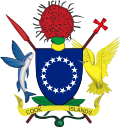| King's Representative in the Cook Islands | |
|---|---|
| Te Kauono o te Ariki (Cook Islands Māori) [1] | |
 Coat of arms of the Cook Islands | |
 Flag of the king's representative | |
| Viceroy | |
| Seat | Avarua |
| Nominator | Prime Minister of the Cook Islands |
| Appointer | Monarch on the advice of the prime minister |
| Term length | 3 years renewable |
| Precursor | High Commissioner of the Cook Islands |
| Formation | 1982 |
| First holder | Gaven Donne |
 |
|---|
The king's representative is the official representative of Charles III , as King of the realm of New Zealand, in the Cook Islands. [2] The office of King's Representative is established by the Constitution of the Cook Islands. They are appointed by the King for a term of three years, and may be reappointed. [3] When the Cook Islands has a queen regnant, the viceroy is titled queen's representative.
Contents
The king's representative fills the role normally filled by a governor-general in the Westminster system of a Commonwealth realm, being both a representative of the monarch and the titular head of executive government. They appoint the prime minister and Cabinet [4] and chair the Cook Islands Executive Council. [5] In performing their duties, they must act on advice. [6]
Originally these duties were performed by the high commissioner of New Zealand to the Cook Islands, but in 1982 these powers were repatriated. [7] The governor-general of New Zealand still represents the king in matters pertaining to the entire realm. [8] [9]
Following the death of Elizabeth II, the office formally became known as "King's Representative". [10]
In August 2025, Tom Marsters was reappointed as the representative for a fifth three-year term. [11]



